
The flag of Tunisia is a rectangular panel of red color with an aspect ratio of 2:3. In the center of the cloth in a white circle is placed a red crescent, surrounding a red five-pointed star on three sides. The Tunisian Bey Hussein II decided to create a flag for Tunisia, close in appearance to the modern one, after the Battle of Navarino on 20 October 1827; in 1831 he was officially approved. In that form, the flag existed during the French protectorate, and on 1 June 1959, it was proclaimed the state flag of the Republic of Tunisia. On 30 June 1999, the proportions and design of the flag were clarified by a special law. The general appearance of the flag remained virtually unchanged.
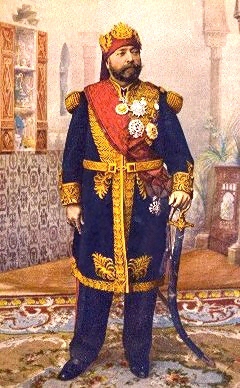
Muhammad V an-Nasir, commonly known Naceur Bey was the son of Muhammad II ibn al-Husayn and the fifteenth Husainid Bey of Tunis, ruling from 1906 until his death. He was named Divisional General of the Beylical army when he became Bey al-Mahalla on 11 June 1902, and assumed the rank of Marshal when he succeeded Muhammad IV al-Hadi on 11 May 1906.

Muhammad VIII al-Amin commonly known as Lamine Bey, was the last Bey of Tunis, and also the only King of Tunisia.

Tunisian independence was a process that occurred from 1952 to 1956 between France and a separatist movement, led by Habib Bourguiba. He became the first Prime Minister of the Kingdom of Tunisia after negotiations with France successfully had brought an end to the colonial protectorate and led to independence.
The Tunisian national movement was a sociopolitical movement, born at the beginning of the 20th century, which led to the fight against the French protectorate of Tunisia and gained Tunisian independence in 1956. Inspired by the ideology of the Young Turks and Tunisian political reforms in the latter half of the 19th century, the group of traditionalists—lawyers, doctors and journalists—gradually gave way to a well-structured political organisation of the new French-educated elite. The organisation could mobilise supporters to confront the authorities of the protectorate in order to advance the demands that it made of the French government. The movement's strategy alternated between negotiations and armed confrontations over the years. Support from the powerful trade unions and the feminist movement, along with an intellectual and musical cultural revival, contributed to a strong assertion of national identity which was reinforced by the educational and political systems after independence.
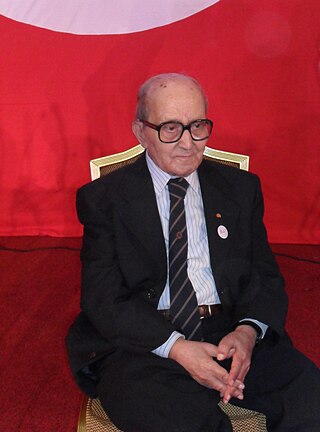
Mohamed Talbi, was a Tunisian author, professor, and Islamologist.

Mezri Haddad is a Tunisian journalist, writer, philosopher and diplomat. Haddad was a doctor of moral and political philosophy at the Paris-Sorbonne University, and the first Muslim candidate to be qualified by the National Council of French universities as a lecturer in Catholic theology. He is the author of several essays that focus on politics and religion.
The 1987 Tunisian coup d'état involved the bloodless ousting of the aging President of Tunisia Habib Bourguiba on 7 November 1987, and his replacement as President by his recently appointed Prime Minister, Zine El Abidine Ben Ali. The action was justified by reference to Bourguiba's failing health and Article 57 of the country's constitution. Reports later surfaced to indicate that the Italian intelligence services had been involved in planning it.
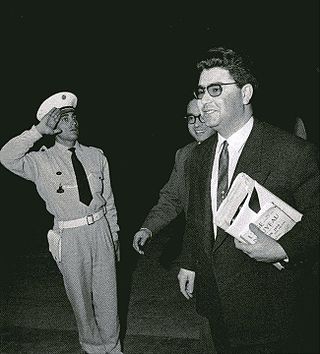
Ahmed Ben Salah was a Tunisian politician and trade union leader. His power and influence peaked between 1957 and 1969 when he was able to implement his ideas for a planned economy, holding simultaneously several key ministerial posts.

L'Action Tunisienne is a former Tunisian Francophone newspaper founded by Habib Bourguiba and published from November 1, 1932, to March 19, 1988. Working for the Destour party, at first, it later became part of the Neo-Destour then the Socialist Destourian Party, since its foundation on March 2, 1934, in Ksar Hellal.

The Tunisian naturalization issue was a protest movement against French and Tunisian laws that eased access to French citizenship in 1933, during the French protectorate of Tunisia. It was active in preventing the burial of Muslim Tunisians who had adopted French nationality in Muslim cemeteries. These riots revived the Tunisian national movement, which had been weakened after the 1926-28 repression.
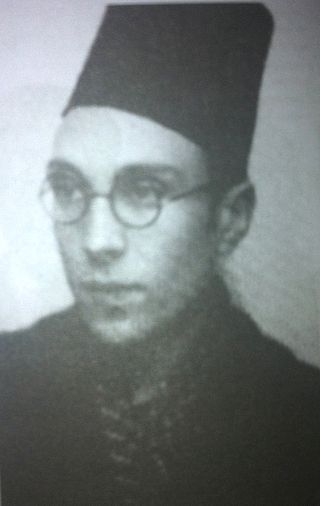
Bahri Guiga was a Tunisian lawyer and politician.

The Ksar Hellal Congress was the first and founding congress of the Neo Destour party. The 1934 Neo Destour Congress was organized by the secessionist members of the Destour party, in Ksar Hellal, on March 2, 1934. It ended, that very night, with the creation of a new political party.

Mohamed Sayah was a Tunisian politician who held a number of ministerial roles in the 1960s, 1970s, and 1980s.
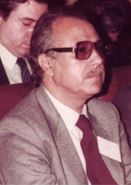
Mohamed Fourati was a Tunisian cardiovascular surgeon. He pioneered in open-heart surgery in the Arab-Muslim world. As a professor and lecturer for 39 years, he taught and mentored a generation of young surgeons in Tunisia.
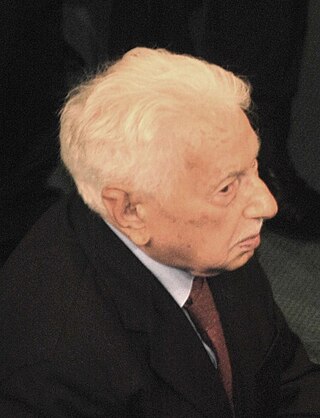
Mustapha Filali was a Tunisian politician. He was the first Tunisian Minister of Agriculture after their independence.

Sophie Bessis is a Tunisian-born French historian, journalist, researcher, and feminist author. She has written numerous works in French, Spanish, and English on development in the Maghreb and the Arab world, as well as the situation of women denouncing the identity imprisonment to which they are subjected. She is the recipient of the Paris Liège literary prize and was honored as Commandeur of the Order of the Republic.
Paul Sebag, born 26 September 1919 in Tunis and died 5 September 2004 in Paris, was a French-Tunisian sociologist and historian.
The Ministry of the Pen was a ministerial position in Tunisia between 1860 and the end of the monarchical regime in 1957.
Mohamed El Aziz Ben Achour is a Tunisian politician and historian born on 5 January 1951; he specializes in urban, social and cultural history of modern Tunisia and the Islamic civilization. He was the Minister of Culture some time between 2004 and 2008, and later Director-General of the Arab League Educational, Cultural and Scientific Organization (ALECSO) some time between 2009 and 2013.















